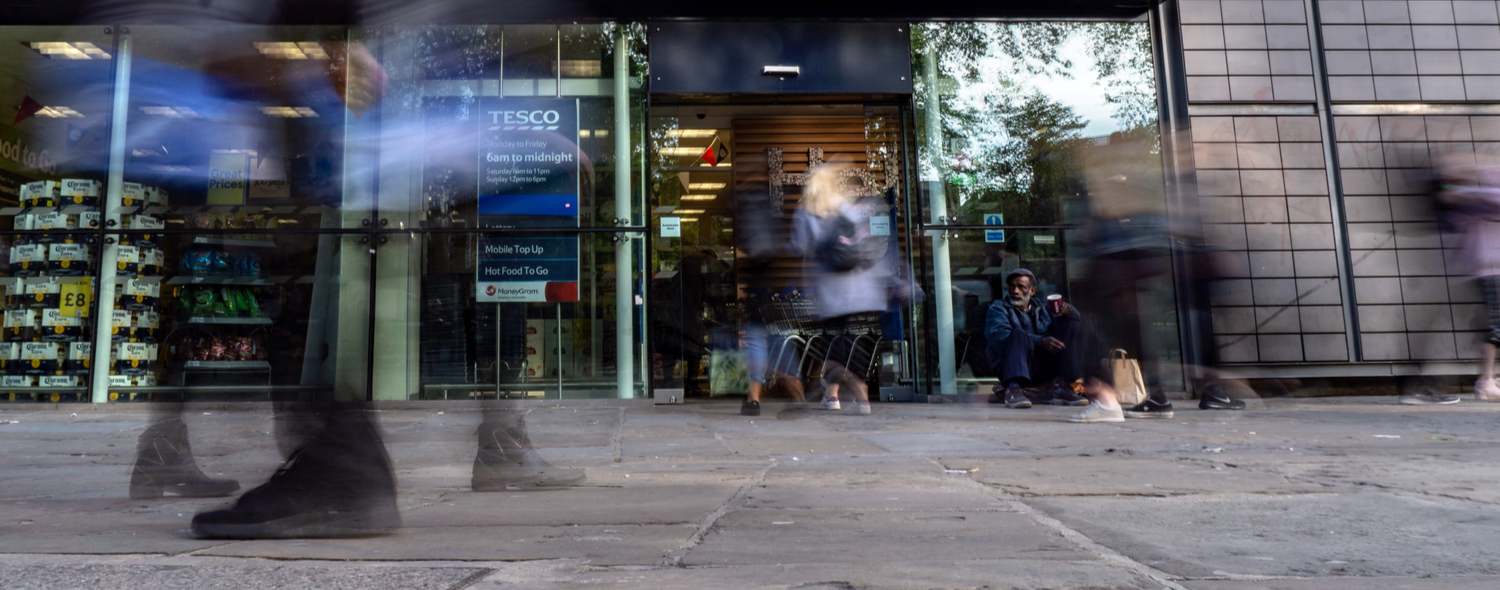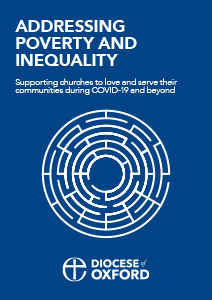 Poverty and inequality challenges in communities across the Thames Valley
Poverty and inequality challenges in communities across the Thames Valley
A new report, Addressing Poverty and Inequality: Supporting churches to love and serve their communities during COVID-19 and beyond, published by the Diocese of Oxford, tells the story of poverty and inequality in a wide range of community and church contexts across the Thames Valley region.
Earlier this year, the Poverty and Inequality Steering Group in the Diocese of Oxford undertook a targeted consultation to hear from churches about the challenges they and their communities face.
The consultation explored how churches have responded to the challenges and how this can inform the future mission and ministry of churches in the diocese. The results and responses indicate the significant impact of the pandemic on communities as well as the breadth of social action responses from churches stepping in to serve local people in need in their communities.
“[there has been a] significant increase in food poverty, and more families struggling to make ends meet... Many seem to neglect their self-care and describe irrational emotions and extremes of behaviour. Single mothers are struggling to manage children’s behaviour at home and the pressures of online schooling, some children are suffering from anxiety and depression.”
A significant number of local churches experienced considerable changes in their levels of social engagement during the pandemic. Encouragingly, 50% of those surveyed reported that the pandemic had prompted an increase in collaborative working between their church and other churches or community groups.
Churches pointed to the pre-existing pastoral care relationships and the foundation this created for offering support in their communities. The report highlights how churches are embedded in every community across the Thames Valley and uniquely positioned to be alongside marginalised people, and to mobilise community-wide engagement in social action and in campaigns for social justice.
“This crisis has demonstrated how well people look out for their neighbours…” “We [a parish church] were not often the key organiser, but we have been able to be effective partners through our communication network and our team of volunteers, and through lending out our buildings.”
The report identifies a variety of social issues which require churches to adopt different postures and approaches in their social action responses. These include transport poverty, affordability of rural housing, hidden poverty, community engagement in transient areas and new housing developments.
 The main outcomes of the research and report are for:
The main outcomes of the research and report are for:
- churches to further develop their understanding of their local contexts and to increase the agency of those most affected by poverty
- the diocese to further develop its understanding of the challenges churches and communities face, noting particularly the desire for help with knowing how to engage and feeling able to engage
- churches to build connections with others in their area working on similar issues of concern
- the diocese to support churches to increase their social capital
- churches to tackle practical challenges by engaging with their communities
- the diocese to invest in appropriate training and support for churches
The Reverend Liz Jackson, Associate Archdeacon of Berkshire and co-author of the report said: “It is inspiring to hear about so many churches stepping up to support their communities during the pandemic but also beyond this as they reconnect and build on the new connections established during the past couple of years. “The research has importantly identified areas where churches feel they need more support from the diocese. This will enable us to work with churches across the diocese to develop new and effective ways to support churches to love their communities and learn from each other in their different contexts.”
The Bishop of Oxford, the Rt Revd Dr Steven Croft said: “The imperative for Christian communities to engage in social action and social justice lies at the heart of our faith – it is in our Scriptures, our history, and in our deep longing to see the Kingdom come. It is an endeavour to which all of us in the Diocese of Oxford continue to commit ourselves. This insightful report illustrates the ongoing challenges and complexities created by COVID-19 as well as the vital and unique role churches play in supporting their communities through the ups and downs of everyday life. I am excited at the prospect of the future positive impact we can have in our communities across the region.”
The Venerable Stephen Pullin, Archdeacon of Berkshire and Chair of the Poverty and Inequality Steering Group shared his reflections on the report: “The report emphasises ways in which churches have adapted well to changing circumstances and have discovered innovative ways to make a positive impact in areas of emerging and greatest need. The findings set out in the report will help to shape the priorities of the steering group. We aim to create an online space where effective initiatives can be shared between churches and be continually refreshed and developed, and to encourage churches to work together for the growth of God’s Kingdom.”
Addressing Poverty and Inequality is available to download and read on the Diocese of Oxford website.
ENDS
Notes for Editors
For media enquiries, please contact Madeleine Hayden / 07880 761716
- About the Diocese of Oxford
The Diocese of Oxford is the Church of England in the Thames Valley region of Oxfordshire, Berkshire, Buckinghamshire and Milton Keynes. There are 815 churches in 626 parishes, the largest number of churches of any diocese in the Church of England. The diocese is also home to 284 schools educating some 60,000 pupils. Poverty and Inequality is one of the five key focus areas of the Diocese of Oxford Common Vision. This report follows a major research project carried out in 2017 – For Richer for Poorer: poverty and livelihoods in the Diocese of Oxford.
- About the Report
In-depth structured conversations were held with 30 leaders of different churches across the diocese and an online survey of 149 people in the diocese. Areas of high deprivation (according to the Index of Multiple Deprivation and child and pensioner poverty) were prioritised and these churches demonstrated a wide range of characteristics. Conversations were conducted by Jane Perry, independent researcher, and Revd Liz Jackson, Associate Archdeacon for Berkshire, and carried out between December 2020 and February 2021, during the peak of the second wave of the pandemic.
